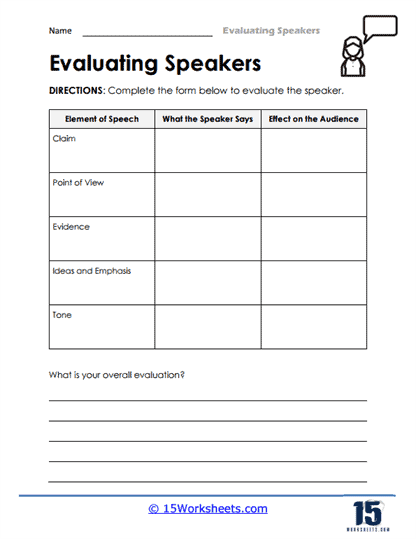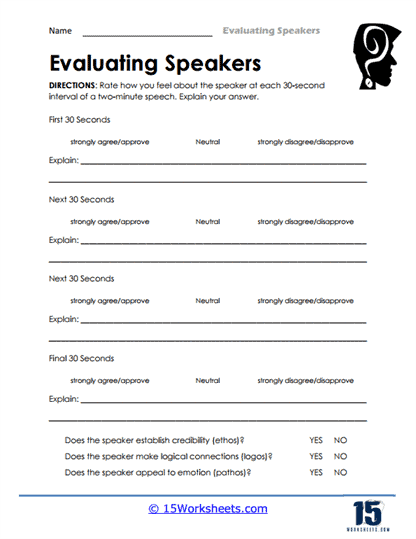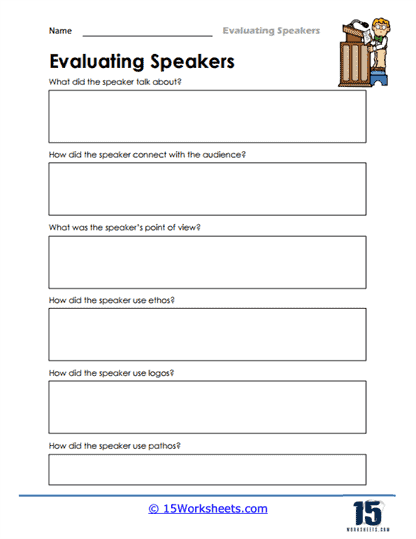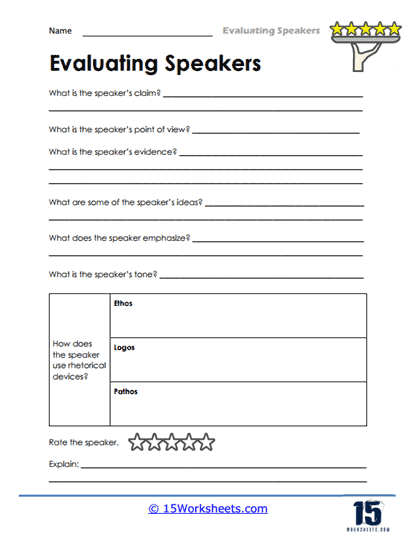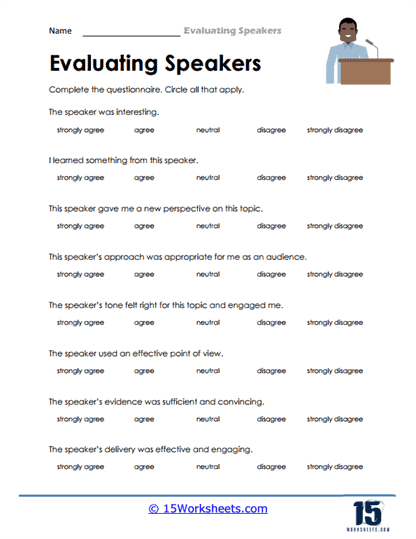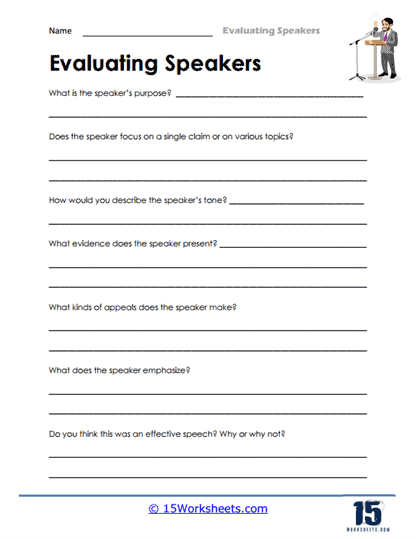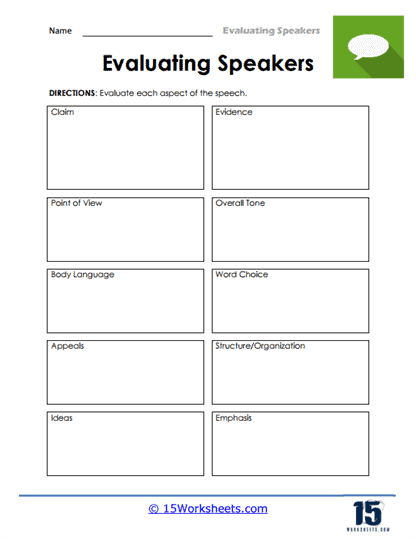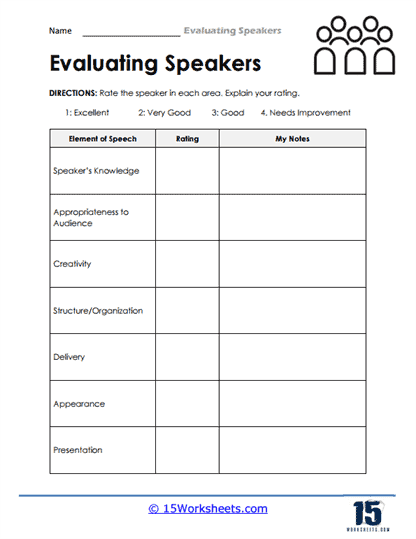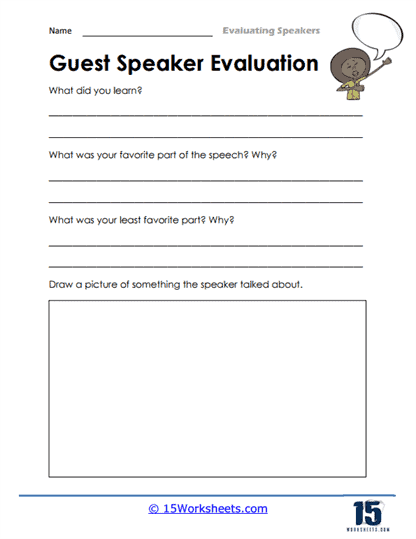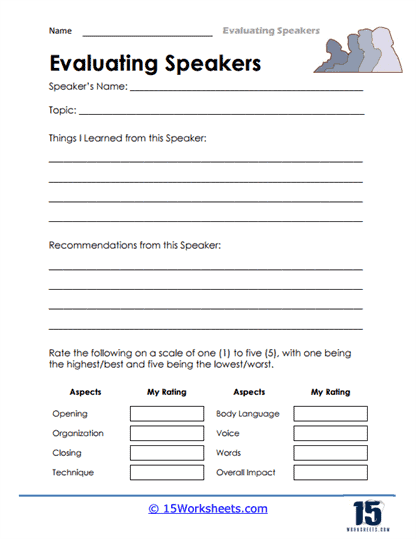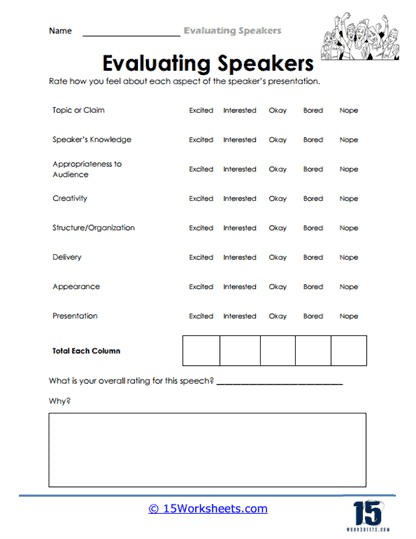Evaluating Speakers Worksheets
All About These 15 Worksheets
Developing the ability to evaluate speakers is a crucial skill that empowers students to critically assess the credibility, reliability, and effectiveness of individuals presenting information. This series of 15 worksheets on Evaluating Speakers is designed to help students become discerning listeners, capable of assessing the quality of oral communication and making informed judgments about the speaker’s credibility and message. Each worksheet within this series focuses on different aspects of evaluating speakers, providing students with the tools they need to become critical consumers of spoken information. Through these worksheets, students will:
- Evaluate a speaker’s claim, point of view, evidence presented, ideas and emphasis, and tone, and their effect on the audience;
- Recognize the strengths of a speaker in terms of the structure of their speech and its other aspects;
- Make relevant recommendations on a speaker’s speech;
- And answer guided writing prompts to thoroughly and critically evaluate the elements of a speaker’s speech.
These Evaluating Speakers worksheets equip students with the skills necessary to become discerning listeners and critical consumers of oral information. By engaging with these worksheets, they will develop the ability to assess speaker credibility, analyze persuasive techniques, evaluate evidence, and assess audience engagement. They will become more adept at recognizing effective communication and making informed judgments about the credibility and reliability of speakers. Ultimately, this series empowers students to engage in thoughtful analysis and enhances their ability to navigate the vast array of oral communication in their personal, academic, and professional lives.
How to Evaluate a Public Speaker
Before evaluating a public speaker, you must view yourself as a partner rather than a critic. It is important that your feedback is candid and thoughtful and can help the speaker improve his public speaking skills if needed.
You need to be clear on the public speaker’s objective and goal of the speech. If you aren’t sure, don’t be afraid to ask. Ask the speaker why they chose to speak about that particular topic and what their thoughts are so that you may have a clearer idea of the challenge at hand.
How to Evaluate a Public Speaker
Understanding the goal of the speech is extremely crucial. Does the speech have a goal? This should be evaluated carefully as it helps the audience have a solid understanding of the content they are listening to. It will also play a massive part in determining the speech’s effectiveness.
Here are some things to look out for:
Introduction
- Was the purpose of the speech made clear?
- Was there a target point?
Main Body
- Was the sub-topic explained?
- Was there sufficient evidence presented for the sub-topic?
- Did the speech flow smoothly?
Conclusion
- Is this a speech that the audience will remember? Did it make an impact?
- Was the speaker able to create enough excitement? Was there a call to action?
- Did the conclusion present any new information?
Things to Pay Attention to When Evaluating a Public Speaker
1. Organization and Flow
When evaluating a public speaker, you must look at how organized his thoughts are. You should be able to follow the topic and understand the structure. You should not feel that the speaker’s thoughts are all over the place, and he keeps switching his thought process before you can understand it.
Moreover, pay close attention to his flow of speech. Does the speaker start a story only to jump to another story, leaving you lost in between?
2. Vocal Delivery
Vocal delivery focuses on speech components that target the speaker’s voice. As someone evaluating a public speaker, you need to pay attention to pitch, rate, volume, fluency, pronunciation, and articulation.
The vocal delivery is extremely important as it helps engage the audience. If your speaker is talking robotically, almost like reading a speech, you will find it hard to pay attention to his speech. Moreover, vocal delivery also ensures how well ideas are being communicated.
3. Body Language
Positive body language helps build credibility and ensures that the speaker expresses his emotions and connects with his listeners effectively. Eye contact, nodding your head at the correct time, using gestures, and maintaining good posture all influence the performance of a public speaker.
Even though the speech might be good, you need to pay attention to non-verbal cues to ensure that the speaker is able to gain the trust of his audience and keep them engaged in his speech.
Suggestions for Improvement
As an evaluator, you must encourage the speaker. Whatever your output is, ensure to end your evaluation on a good note. Your goal should be to make the speaker feel seen and recognize his efforts. He should feel motivated to improve his skills further.
Remember, you are not evaluating the public speaker to criticize him. You are a mentor, meaning you do not need to set yourself up as an authoritative figure. Instead, keep in mind that you are evaluating him so that he can set self-improvement goals for himself.
We would also recommend that you take notes during the speaker’s speech so that you can ask questions and ensure the speaker that you were paying attention.

